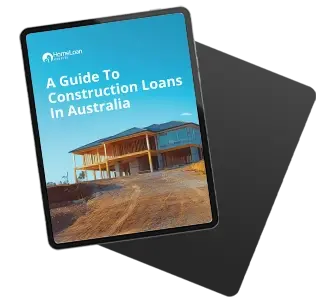So you want to build your own home: that’s great! Do you know what construction loan documents you’ll need to give to the bank and when you’ll need to have them prepared?
Building can be a complex and emotional process at the best of times but when you throw a construction loan into the mix, it can really test you and your builder’s patience.
However, by following some simple steps, you can make the process a lot simpler.
Construction Loan Document Checklist
| Stage Of Construction | What Documents Are Required? |
|---|---|
| Required Before Construction |
|
| Required During Construction |
|
| Required After Construction Is Complete |
|
Getting Approved For A Construction Loan in Australia
A full construction loan guide with common mistakes and how they can be avoided.

What Construction Loan Documents Do I Need To Provide?
First things first: you’ll need to get approved for your construction loan.
Apart from looking at your financial situation including your payslips, last 3-6 months savings, your most recent tax return, and your deposit size, you’ll need to provide your bank with the following:
A Building Contract
This will detail things like the building stages, drawdown schedule, how long construction should take and the final price of the build.
Does The Bank Need A Signed Contract?
Trying to get approved for a construction loan when building a home is a classic example of putting the cart before the horse: you need to provide the bank with a contract in order to get approved for finance but what happens if your application is declined?
We recommend that you don’t sign a building contract unless it has a finance clause that allows you (at least) 3 weeks to organise your construction loan.
If the contract doesn’t have a clause, you can either ask for one to be included or simply get a draft copy of a contract to provide to the bank. Most banks will accept this and, once you’re approved, you can then sign the final contract.
Check out this example building contract.
What If I Just Have A Tender At The Moment?
Some banks will do a loan approval based on a tender alone, which is an unofficial document that provides some basic details of the building costs and what final product the builder will actually be delivering.
The Commonwealth Bank is one such bank that only requires a tender for a construction loan pre-approval.
The problem is that between the tender and actually finalising the contract with the builder, many changes will likely be made.
For example, a soil and contour test can cost upwards of $5,000 while not all building quotes include flooring in their quote.
If the contract is different to the tender, the bank has to revalue the property and, therefore, it delays the construction loan process.
So if you just have a tender, we recommend that you get a pre-approval first.
Not sure what a tender is? Check out this example.
Building Plans
The building plans don’t have to be council-approved at this point. It just gives the valuer an idea of the nature of the property that you’re building.
Check out this example of a development application when it comes time for you to apply with council.
Specifications
Building specifications give the bank an idea of the quality of the materials, appliances and workmanship involved in the build.
For example, are you going to have timber floors or tiles? Are you going to have a split-system air conditioning system? Are you choosing a gas water heater over a hot water system?
The quality of the build can have a huge impact on the final valuation and, ultimately, your borrowing power.
Although you’ll want to do everything to get your construction loan approved, you should be upfront with the full extent of the build because if the costs of construction end up blowing out due to changes you make to the building plans, you’ll need to make up the shortfall with your own funds.
GET ENROLLED FOR THE Home Buyers Program
Quotes For Additional Work
Just in case you haven’t read the building contract fine print carefully, not everything is included in the construction so it’s important to provide quotes for these additional works upfront.
These additional works include:
- Swimming pools
- Sheds
- Landscaping and retaining walls
- Power poles
- Driveways
A quote is generally all you’ll need to provide since these works don’t need council approval. Although it varies, these construction jobs aren’t permanent structures and are often quite cheap to build.
If you provide quotes, you can borrow to finance these additional costs. If you don’t, you’ll likely need to fund these costs yourself.
Be careful as some lenders will only release money for the additional work once the main house is completed. This may not suit your construction schedule so, in some cases, we may need to switch lenders.
Do you need help with getting approved for a construction loan?
Give us a call on 1300 889 743 or complete our free online assessment form and let us know what you’re planning to build.
We know exactly what documents the bank is after in order for them to assess your application and get the ball rolling.
What Construction Loan Documents Do I Need To Provide Prior To The First Drawdown?
Unlike the structure of a standard home loan, construction loans are progressively drawn-down. This means you draw down the loan (or increase your borrowing) as needed to pay for the construction progress payments.
In order to release the first lot of funds to the builder, you’ll need to provide:
- A signed building contract: This means the finalised building contract should be signed and dated by you and the builder.
- A Quantity Surveyor report: Depending on the cost of the building project (generally required for properties valued at more than $1 million), the lenders may require that a quantity surveyor report be included in the contract.
- Council-approved plans: Depending on your state and council, council approval can take anywhere between 42-100 days so it’s good to get on this sooner rather than later.
- Evidence of builder’s insurance: This will vary between states but typically the builder will need to have Public Liability Insurance and Home Building Compensation, formerly known as Home Warranty Insurance (HWI).
Once you provide these documents, the bank will give you the authority to proceed.
Don’t start construction until the bank gives you the authority to proceed!
Banks don’t like to finance something that’s half-built so don’t start construction until you receive that authority letter.
5 Golden Tips For Construction Loan Approval
If you were to take away five tips from this guide, these would be it:
- Choose the right builder: Check out the Choosing A Builder page tips.
- Provide all construction loan documents upfront: Give the bank everything in one go otherwise there’ll likely be a lot of going backwards and forwards and delays, particularly with the valuation.
- Make sure you provide the final version: If you can’t provide the bank with the finalised tender and plan to make further changes to the build, just get a pre-approval not a formal approval. The reason being is that any time the cost of construction changes, the bank needs to send the valuer out to the property again and reassess the valuation. That’s even if the costs change by $100!
- Be careful of overcapitalising: This is where you spend a lot of money to essentially build the best house in the street. There’s nothing wrong with that in itself but just know the banks will undervalue it and won’t lend you the amount you need to finance construction.
- First Home Buyers Grant (FHOG): If you’re eligible for the grant, you should apply for it at the same time you apply for your construction loan.
You can also check out the construction loan tips page for more tips and additional information on building loans.
Do You Need A Construction Loan?
We’re construction loan specialists that can turn the complexities of the process into a smooth and stress-free experience for you.
Call us on 1300 889 743 or complete this easy online enquiry form today.
